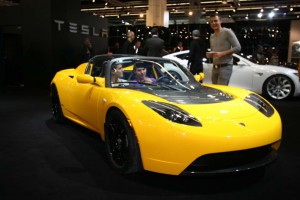Battery car start-up Tesla Motors has sued the popular BBC program, “Top Gear,” claiming it maliciously lied about the company’s 2-seat Roadster.
The legal action, taken in the U.K. aims to have the widely-syndicated show stop rebroadcasting an episode in which one of Top Gear’s hosts claims the Tesla Roadster experienced a series of “breakdowns” while being tested.
A senior Tesla executive cites a comment made by Top Gear host Jeremy Clarkson claiming that, “in the real world, it doesn’t really work.”
But that line, according to a blog by Tesla Vice President Ricardo Reyes, was “written before the cars were tested.”
In the Top Gear episode, the show claims their test vehicle ran out of power after just 55 miles, rather than the 211 Tesla claims, experienced catastrophic brake failure, overheated, and had to be pushed into a garage when it became inoperable.
During the episode, the Tesla Roadster was pitted in a race against a Lotus Elise. The battery car was shown having to stop for a recharge even though it may not have actually run out of electricity.
The lawsuit, argues Reyes, “is the only recourse we have; our repeated attempts to contact the BBC, over the course of months, were ignored.”
A spokesman for the TV show acknowledged receipt of the legal proceedings – which seek damages in excess of 100,000 pounds sterling – but the BBC says it “stands by the program and will be vigorously defending this claim.”
While the program involved in the lawsuit takes some obvious swipes at the Roadster, host Clarkson also has some positive things to say about what Tesla bills as the world’s only electric supercar.
Watching the vehicle zoom past, he blurts out, “I cannot believe this – that’s biblically quick. This car is electric, literally. The top speed may only be 125 mph but there’s so much torque it does 0-60 in 3.9 seconds. Not bad from a motor the size of a watermelon and which has only one moving part.”
The controversy over the Top Gear episode has been raging since it first aired in 2008. A former Tesla official who was on the scene during testing immediately questioned why the car was pushed into the garage.
A subsequent article in the U.K. Register noted that, “According to the Top Gear spokeswoman, the tested Tesla was filmed being pushed into the shed in order to show what would happen if the Roadster had run out of charge.”
At the time, a BBC spokesperson described what was aired as a “fair representation” of what the Top Gear crew experienced during the preparation of the report.
The decision to sue in Britain reflects not only the fact that the show is produced by the BBC but also reflects that country’s less restrictive libel laws, which put the burden on a publisher to defend its actions. In the U.S., the defendant would have to climb a series of much taller hurdles to win.


